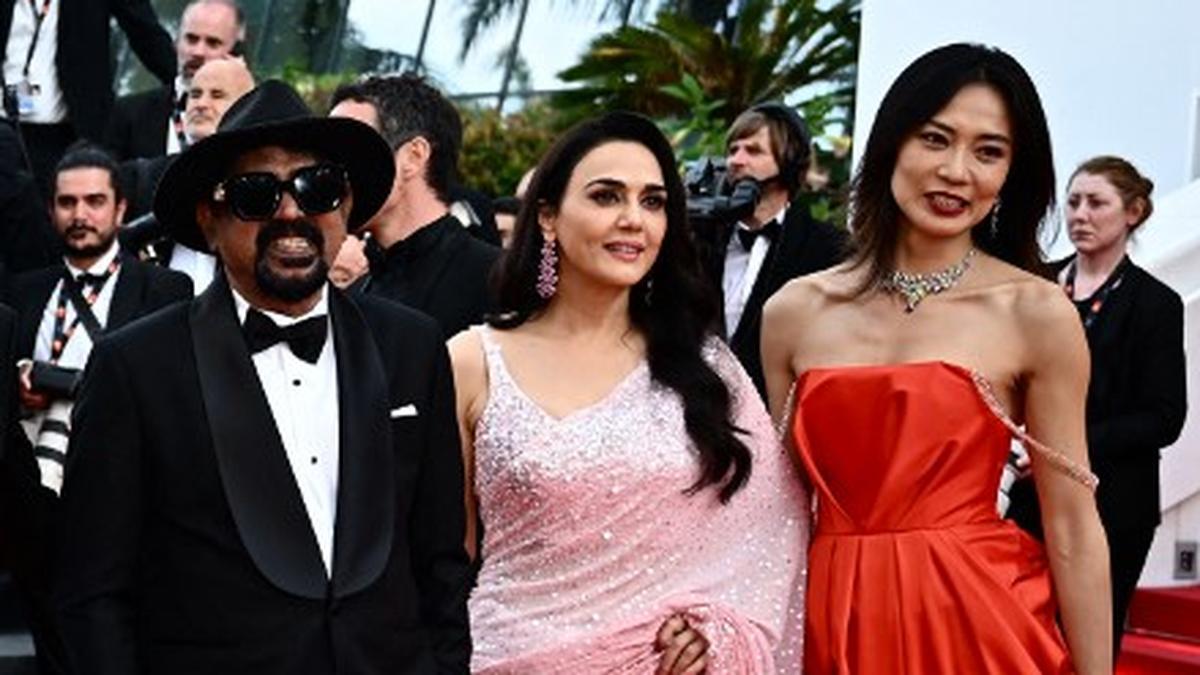
In a dazzling ceremony that dazzled attendees, the 77th Cannes Film Festival witnessed a momentous occasion as Indian cinematographer Santosh Sivan was honored with the prestigious Pierre Angenieux ExcelLens in Cinematography award. The ceremony took place on Friday at the iconic Palais des Festivals, and the award was presented by none other than Bollywood actor Preity Zinta, adding a touch of glamour and poignancy to the event.
The prestigious ceremony not only celebrated the art of cinematography but also highlighted the profound impact of Indian cinema on the global stage. Preity Zinta, adorned in an elegant-toned pink saree, took to the stage to honor Sivan, marking a significant moment in their professional journey. The duo first collaborated on Mani Ratnam’s 1998 romantic drama *Dil Se*, where Sivan’s adept cinematography beautifully captured Zinta’s debut performance. Their reunion at Cannes serves as a nostalgic milestone as they prepare to work together once more in the upcoming period drama *Lahore 1947*, directed by Rajkumar Santoshi.
The Pierre Angenieux ExcelLens in Cinematography award, established in 2013, recognizes outstanding contributions to the field of cinematography. This accolade holds particular importance for Sivan, as he becomes the first Asian to be honored with this award. He thus joins the ranks of legendary cinematographers such as Edward Lachman, Agnes Godard, Barry Ackroyd, and Roger Deakins, further underscoring his remarkable achievements.
In reflecting on his journey, Sivan expressed both gratitude and nostalgia, especially recalling his early experiences with Angenieux lenses in the film *Raakh* (1989), which starred Aamir Khan. In an interview with Variety, he described his feelings: “This award means a lot to me, as previous recipients include DoPs I deeply admire, including Zsigmond and Deakins.”
Santosh Sivan’s illustrious career spans several decades, comprising over 55 feature films and numerous documentaries. His notable collaborations with director Mani Ratnam on films such as *Roja*, *Thalapathi*, *Dil Se*, and *Iruvar* have left an indelible mark on Indian cinema. Sivan’s dedication to his craft and his ability to fuse narrative and visual artistry have made him a beloved figure in the world of filmmaking.
.
Sivan’s impact extends beyond Indian cinema to international projects as well. He has worked on acclaimed films like Gurinder Chadha’s *Bride and Prejudice* and MF Hussain’s *Meenaxi: A Tale of Three Cities*. Discussing his artistic philosophy, Sivan once eloquently remarked, “For me, light and shade is the melody, and the composition and movement of the camera is the rhythm. If I find that these two elements are present in a shot, then I am most excited, I like that.” His ability to weave these elements together has defined his unique cinematic style.
The seasoned cinematographer also spoke about his transition from celluloid to digital cinematography. This significant shift in his career began with his directorial venture *Urumi* (2011) and fully embraced digital with the film *Thuppakki* (2012). Sivan’s willingness to adapt and evolve with changing technology underscores his commitment to innovation and progression in the field of cinematography.
The event at Cannes not only honored Sivan’s remarkable achievements but also paid tribute to the enduring legacy of Indian cinema. The richness and diversity of Indian filmmaking have captured the hearts and minds of audiences worldwide, and Sivan’s recognition serves as a testament to the remarkable talents that continue to emerge from the Indian film industry.
As Santosh Sivan stood on the stage at the Palais des Festivals, accepting the Pierre Angenieux ExcelLens in Cinematography award, he symbolized the pinnacle of artistic excellence. His journey from the early days of using Angenieux lenses to becoming the first Asian recipient of this esteemed award is a story of dedication, creativity, and the relentless pursuit of cinematic brilliance.
In a world where the magic of cinema captivates and inspires, Santosh Sivan’s contribution to the art of cinematography will continue to resonate, leaving an indelible mark on both Indian and global cinema. The celebration at Cannes was not just about honoring an individual but also about acknowledging the collective spirit and impact of cinematic storytelling.












